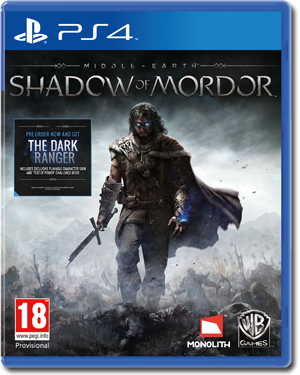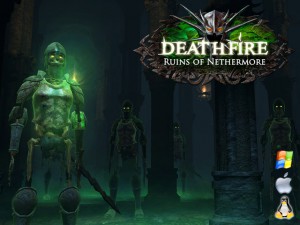Does the “Nemesis System” feel familiar to you? Perhaps it should…
 I have to be honest. I did not follow the development of “Shadow of Mordor” at all. As you may recall, after it turned out to be impossible to get a viewing of the game during this year’s E3 despite my hour-long wait, I lost interest in the game altogether.
I have to be honest. I did not follow the development of “Shadow of Mordor” at all. As you may recall, after it turned out to be impossible to get a viewing of the game during this year’s E3 despite my hour-long wait, I lost interest in the game altogether.
Now that it has been released, a lot of coverage has been given to one of the game’s innovative features, the so-called “Nemesis Feature,” which creates pseudo-intelligent opponents that follow certain social orders and appear to populate a living and breathing world that gives every entity the player encounters in the game world goals and purpose. Hmmmmh… I thought to myself when I first heard about this. That does sound very familiar to me!
If you may recall, a year ago we were trying to fund a game project called “Deathfire” through Kickstarter. It was a traditionally-based role-playing game, much in the vein of the award-winning “Realms of Arkania” cRPGs I have been working in the past, with an exceptionally strong focus on characters. Everything in the game was designed around the charcaters in the game and the emotional response you get from their interaction. Not only the player characters, but all the characters in the game world, including your opponents and the monsters. As you may recall, the system we outlined and had begun to develop for the game was called the “Psycho Engine.”
As I explored Mordor’s Nemesis Feature in more detail, it became apparent to me very quickly that in essence it is the same thing as the Psycho Engine I had designed well over a year ago.
Our system was designed to create player and non-player entities/characters that showed behavior along certain personality lines, independently of what the player is doing. By doing so, these characters would not only have appeared visually unique in the game, because their appearance could be tailored to their stats in real-time, but they would also follow individual goals, determined by the Psycho Engine upon tracking and subsequently analyzing the state of the game and the world.
If you compare this to the Nemesis Feature, you will see that it is a carbon copy of what is happening in the game “Shadow of Mordor.” Depending on certain randomly determined parameters, the game creates unique orcs that follow a visual appearance and naming guided by the parameters. Once they make an appearance in the game, they will follow certain goals, such as improving their rank within the orc army or to get involved in one of the many spill-over plots and quests the game offers for that purpose. In addition, these orcs have personalities, based on the parameters, giving them a certain set of dialogue lines and behavioral patterns to match their personalities and goals that make them distinctive and seemingly unique—within limits.
In a nutshell, it is exactly what the Psycho Engine outlined.
The Nemesis Feature also tracks events such as the survival of an orc. If he’s been involved in many battles during the game, like the player, he will level up and become stronger, making sure the same orc will match the player’s progress and always remain challenging when encountered. Once again, this is a feature we had outlined in the Psycho Engine. In fact, the Psycho Engine went even further, giving these entities the knowledge when they were inferior, so that they would be able to respond to it by either abandoning their goals, or by pursuing them even more aggressively.
 Just as our Psycho Engine, the tracking of information and data analysis capabilities of the Nemesis Feature go far beyond just these basics, however, and like our Psycho Engine it takes the information it gathers into account to influence the story and the world around the player. In the case of “Deathfire” we had many small story scenarios and side plots in petto, which were lying dormant in the game until the Psycho Engine would awaken them as a result of certain triggers, activated by either the player or some Psycho Engine-controlled entity.
Just as our Psycho Engine, the tracking of information and data analysis capabilities of the Nemesis Feature go far beyond just these basics, however, and like our Psycho Engine it takes the information it gathers into account to influence the story and the world around the player. In the case of “Deathfire” we had many small story scenarios and side plots in petto, which were lying dormant in the game until the Psycho Engine would awaken them as a result of certain triggers, activated by either the player or some Psycho Engine-controlled entity.
You can observe the same kinds of events in “Shadow of Mordor,” where the actions of orcs seem to trigger relevant, as well as irrelevant, events relating to the overall story and world. You can observe them pursuing virtual careers and following random events that create rather complex goals, almost like their own side plots.
Seeing the Nemesis Feature in action is a bitter sweet pill for me, as you can certainly imagine. On the one hand the fact that it has been hailed by gamers and the media alike as the most important innovation in computer games in many years makes me happy, because it proves to me that I have been on the right track when I devised the Psycho Engine well over a year ago, at a time when no one was working on technology such as this, really. Of course, now that it has been touted as the revelation that it is, everyone will try to implement technology such as this in their future games. Which is definitely cool and all, because it will result in better games. Still, the thought that we were actually on the bleeding edge of this technology, yet will forever be completely unrecognized by gamers and the media alike, feels like a backhanded slap somehow.
The thought that “This could have been us!” just keeps nagging at me, but in the end, it was an inevitable development. Somebody was bound to do it sooner or later, particularly since the idea for the technology has been germinating in my mind for years.
In retrospect, it is clear that at the time when we first laid information about the Psycho Engine open, the public did not appreciate or understand the far-reaching impact this technology would have on gameplay, as evidenced by the fact that “Deathfire” did not find even the modest financial support we required to continue developing and completing the game.
It will be interesting for me to see how future games will evolve this technology and make even better use of it. The capabilities of a system like the Psycho Engine, or the Nemesis Feature for that matter, are endless and are only limited by the granularity of the information a game keeps track of and, perhaps, its ability to spend processing time on the proper analysis of the data. In “Deathfire” the concept was to go pretty deep. Because the game wasn’t nearly as graphics-intensive as AAA-titles, there would have been headroom to dig pretty deep into the system and make use of the Psycho Engine with insane levels of depth. Imagine the possibilities in a real role-playing game, as opposed to what you are glimpsing in an action-oriented game like “Shadow of Mordor” and you will get a sense for what “Deathfire” would have been capable of.
It will be interesting to watch what other games will be doing, but remember, no matter what anyone tells you, you saw it here first! The Psycho Engine was way ahead of the curve, even if other games now claim the laurels!

That’s pretty harsh. But on the other hand, even if Deathfire had been published, it most likely would not have gotten the same publicity as Shadows of Mordor, and the Psycho Engine would have stayed unrecognized by the mainstream media nonetheless. It would have been a rare gem, known only to a few. I feel with you, however. Today, we can dream, what could have been.
On a second thought, the Psycho Engine’s effect ingame could have been so amazing that it could have made Deathfire a bestseller. Who knows? I really hope we will see a game with the Psycho Engine someday.
I’m so glad to have discovered that you have a blog Mr. Henkel, that’s super!
It’s sad though that Deathfire was not funded, it would be amazing to see the Psycho Engine in action. Even though Shadows of Mordor got credit for the idea, I’m pretty sure Deathfire can make it a lot more interesting since it is indeed a RPG. So I hope everything works out for you and your team in the end.
Best regards, from a fan in Brazil.
I agree, a real shame.
There is always a place for old style RPGs especially enhanced with better graphics, NPC actions etc.
I still find it hard to believe that ‘Deathfire’ failed to achieve its funding target.
Oh well, perhaps one of us will win big on Euro Millions and resurrect it 🙂